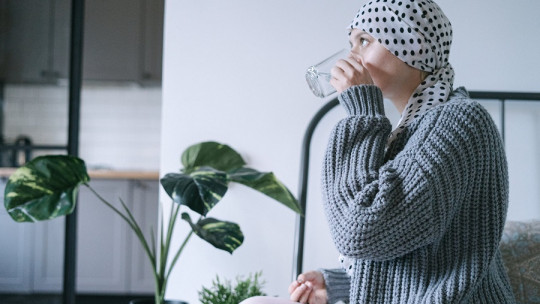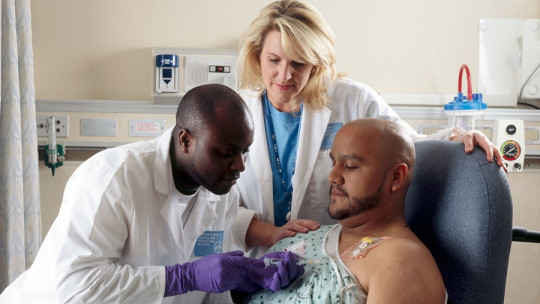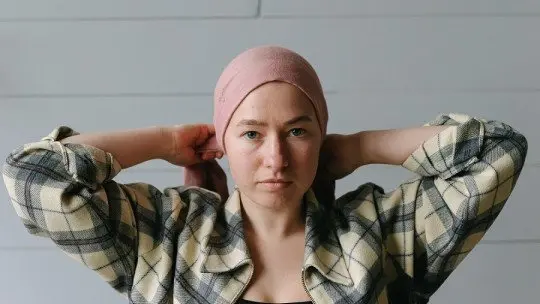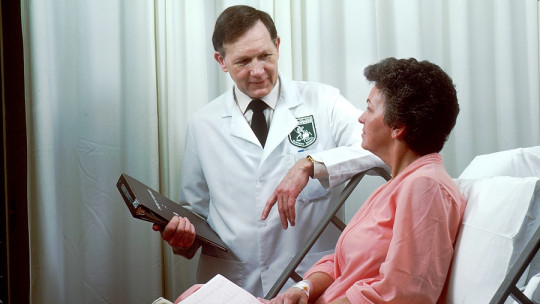
When carrying out cancer treatment in recent years, much attention has been paid to the great importance of having a positive attitude.
To this end, some hospitals have psycho-oncology professionals who can help patients and their families, providing them with tools to face the diagnosis and treatment of cancer. But in any case, it also helps if the patient and/or his or her family know ways to foster a positive attitude toward cancer.
So, below we will review several Tips on how to have a positive attitude about cancer and prevent as much as possible the appearance of mood disorders, anxiety, etc.
Tips to have a positive attitude when faced with cancer
When someone receives the diagnosis of having developed any type of cancer, we do not know how they will react, since it varies greatly depending on each person, with a series of variables that tend to have a significant influence (e.g., age, socioeconomic level). and the resources that the patient has to face the treatment, social and family support, etc.).
That is why, whatever the case, it is advisable to present a series of recommendations compiled by experts in the field about how to have a positive attitude towards cancer, as we will see below.
1. Trust the medical team
It is essential to have a positive attitude towards cancer to trust the medical team that will provide the treatment. This way you can begin to actively face the treatment they provide you and, to do this, a good start would be to have fluid communication with the professionals who are going to help you, since they are the main support in order to be able to overcome the disease by carrying out the treatment sessions, providing you with the necessary information, advising you and even They could support you emotionally.
Some teams even have psychologists who can provide you with adjuvant psychological treatment along with cancer treatment, in order to help you cope with the disease and its treatment.

Therefore, It is important that the patient knows all the details about their medical condition, about the treatment you are going to receive, its side effects and also about possible changes in your body image due to the disease and the treatment, as well as what you could do to cope with your situation. However, each person is different and, therefore, has different needs, so he should not hesitate to consult with specialists about all the doubts he may have and never be left wanting.
2. Express feelings
The second recommendation about how to have a positive attitude towards cancer is to allow yourself enough space to express all the emotions and feelings that you may experience, since repressing negative feelings is counterproductive and can cause greater psychological discomfort in the long term, which will make the process of coping with the disease and adherence to treatment difficult on a psychological level.
By this, we also mean that the “tyranny of positive thinking at all times” should be avoided, since although having it, you cannot force the fact of having to be well all the time, it is normal for there to be moments of sadness and one finds oneself discouraged. The important thing in these cases is to give yourself time to express those feelings and thus let off steam, releasing tensions in order to promote a globally positive attitude towards cancer.
3. Lean on close people
The third recommendation about how to have a positive attitude towards cancer is to rely on close people such as family, partners and/or trusted friends, since social support is very important to be surrounded by loved ones, since they are those that make people happier, being present even in the hardest moments to give all their love. It is important that they accompany the patient at all times to that you do not feel alone or lose heart in the hardest moments during the treatment process.
These people can also provide emotional and instrumental support to the patient (e.g., helping them with household chores, accompanying them to radiotherapy sessions, accompanying them to sessions with the psychologist, driving them to places if needed, going to visit him at the hospital, etc.).
Likewise, people close to the patient must be psychologically prepared for the changes that will occur as a result of the disease as a result of hospitalization, treatment and also due to the patient’s new needs.
4. Try to understand your own body more closely
The fourth recommendation to have a positive attitude towards cancer would be to try to get to know your own body more closely and give it what it asks of us at all times, since it is important to recognize the physical and mental strengths and weaknesses, since no one is going to take care of you. the health of a patient like himself, being the one who knows himself best, so it is important to pay attention to the physical symptoms of his own body and pay special attention to how certain foods, situations, places affect health And everything that does not feel good to the body should be eliminated.
It is important to be careful with anything that can make your body feel bad in order to be as physically fit as possible to be able to maintain a positive attitude towards cancer.
5. Have an active social life although establishing certain limits
The fifth recommendation to have a positive attitude towards cancer is to have an active social life, surrounding yourself with trusted people with whom you can spend pleasant times and also share experiences, doubts and fears, just as you did before receiving the diagnosis. in order to lead a life that is as adaptive as possible, thus promoting the patient’s well-being.
A very important function that true friends fulfill is to make us spend pleasant moments while they make us, even if indirectly, forget about our worries so as not to always suffer that psychological burden.
- You may be interested: “What is Social Psychology?”
6. Maintain good lifestyle habits and do pleasant activities
The seventh recommendation about how to have a positive attitude towards cancer would be to have healthy lifestyle habits such as sleeping enough, not smoking or drinking alcohol, eating healthy, staying active as much as possible (if possible, giving a walk every day at least), perform recovery or physical fitness maintenance exercises within each person’s possibilities, do things that we find pleasant (e.g., reading a good book, watching series, etc.) and, of course, taking time for yourself and to be with friends and family.
To have a better rest, You can try certain alternatives such as yoga, meditation and/or Mindfulness since it is proven that they help you fall asleep better, which is essential for the body to rest and have more energy to face everyday life.
In addition, practicing certain relaxation techniques can help reduce subjective sensations of anxiety, muscle tension, and the activity of the sympathetic nervous system, as well as being useful in certain stressful situations (e.g., in the days prior to admission). hospital, waiting for news from the doctor, transfer to the operating room, etc.).
- Related article: “How to generate new healthy habits?”
7. Adapt vital objectives to a possible progressive limitation
It is also useful to gradually adapt vital objectives in the face of a possible progressive limitation; the pace of life should adapt realistically at all times. Of course, without ever losing the desire to improve in everything that is possible and not wear out more than necessary, in order to promote optimism and self-realization.
If possible, certain skills (e.g. domestic, work and other tasks) should be progressively recovered.
8. Seek help from a mental health professional if deemed necessary
A highly recommended option to know how to have a positive attitude towards cancer is to seek the help of a psychologist who can accompany you during the process of accepting the disease, to help you with possible psychological difficulties suffered comorbidly with cancer (e.g. depression, anxiety, distress, etc.) and to help you cope with the treatment process, among other things. Although in many cases the hospital where you are being treated has a team of psychologists in charge of providing psychological support to oncology patients.
There are psychologists specialized in psycho-oncology which count among their main functions: having to provide help to patients and their families when facing the disease and improving adherence to medical treatment. They are also responsible for helping to improve the quality of life of oncology patients, encouraging them to always keep their self-care in mind, helping them restore their balance on a personal, psychological and family level during the illness and also when they have overcome it.
There are a series of psychological needs that both patients and their families could have, such as the following:
- Shock at the diagnosis.
- Face the illness.
- Depression and anxiety.
- Prepare for treatment and hospitalization.
- Manage pain.
- Manage coping with the side effects of treatment.
- Palliative care.
- Rehabilitation.
- Assistance to family members in grief and loss.
Another alternative, which can also be used in combination with medical treatment and psychological help, would be seeking support from an association that is accessible in your locality that is focused on the fight against cancer (e.g., in Spain there is the Spanish Association Against Cancer), where they provide patients, among other things, medical and nursing guidance, care psychological, social support and care, accompaniment, etc.








